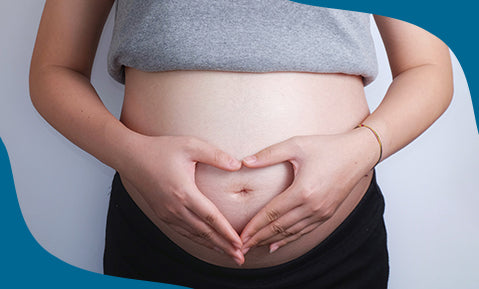
Sleeping Position During Pregnancy
There are many different ways that people sleep at night, but finding the best position for you during pregnancy can be a challenge if you don't know what to look for. This article provides a few tips on how to find your ideal sleep position so that you can be comfortable, healthy, and safe during your pregnancy.
Sleeping during pregnancy is important for both mother and baby. In many cases, a good night's sleep is vital for the mother's physical and emotional health. It is also important for the baby because it helps him or her develop properly. Unfortunately, many pregnant women do not get enough sleep. This can have serious consequences for both mother and baby.
There are many sleeping positions during pregnancy that are safe and comfortable for both mother and baby. Some of the most common sleeping positions while pregnant are lying on your back, side, or stomach. It is important to find a position that feels comfortable for you and allows you to rest your entire body. You should also make sure that you are using a pillow that is comfortable for you.
If you are having trouble sleeping, there are some things that you can do to help. First, make sure that you are getting enough restful sleep. Try to avoid caffeine, alcohol, and cigarettes before bedtime. Additionally, try using relaxation techniques such as yoga or meditation. If these methods do not work, speak with your doctor about sleeping medication or supplements that may help you get to sleep.
Which Sleeping Position is Best for Your Pregnancy?

Sleeping during pregnancy is necessary for both you and your child. However, which sleeping position is best for you? The American Pregnancy Association (APA) recommends that pregnant women sleep on their left side to reduce the risk of having a c-section.
The following are six other sleeping positions that may also be beneficial for pregnant women:
- On your back: This is the most common sleeping position for pregnant women and allows your body to rest in natural alignment.
- In a foetal ball: This position gently supports your baby’s head and neck while they sleep, helping to reduce the risk of SIDS.
- With your legs pulled up towards your chest: This position helps to keep your spine healthy by decreasing the amount of pressure on your discs.
- Side-lying: This position can help relieve back pain by redistributing pressure off of your spine. It’s also a good choice if you have concerns about pregnancy-related sciatica.
- Supine: This position encourages deep rest by supporting all of your organs and tissues. It’s also a good choice if you suffer from anxiety or insomnia.
- Kneeling: This position promotes good blood circulation by encouraging blood flow to the legs and spine.
- Sitting upright: This is a great choice if you have back pain or heart disease.
- Lying on your side: This position can help relieve sciatica and improve digestion.
- Swinging: This is a great way to release tension in your lower back and hips.
- Standing: If you have any health conditions that make it difficult for you to sit, this is a great alternative.
- Standing on top of an incline (elevated surface): Elevating your feet can help break up pressure from sitting down.
- Walking: Many mothers find that walking helps them sleep better at night as well.
Sleeping Positions During Pregnancy To Avoid Back Pain

Pregnancy can be a difficult time for some and a relatively easy time for others. The key to pregnancy that you should always follow is having good knowledge, so you can sleep well and avoid pain and discomfort during your baby's arrival. This article offers some tips on how to rest in the best position possible while you're pregnant.
What Sleeping Position During Pregnancy to Keep From Causing Back Pain

Sleeping on your back during pregnancy can cause a lot of pain in the lower back. A better sleeping position is to sleep on your side, which will help to decrease pressure on the back. You can also try sleeping on your stomach, or using a pregnancy pillow.
What Sleeping Positions Sometimes Cause Back Pain
Sleeping on your back during pregnancy can be a risky proposition, according to experts. Sleeping on your stomach can help to reduce the risk of back pain in the short term, but sleeping on your back may actually increase the risk of developing back pain in the long term. Sleeping on your side can also be a good option for pregnant women, but it’s important to remember that you should never sleep on your stomach if you have any spinal issues.
The best sleeping positions during pregnancy are typically those that place you in a neutral position with your knees bent and your hips elevated. If you find that you’re experiencing back pain while sleeping, it may be helpful to consult with a health professional who can help you find a comfortable sleeping position that won’t cause pain.
What are the Other Benefits of Sleeping in Different Positions?
There are many benefits to sleeping in different positions during pregnancy. Some of the benefits include:
- Increased blood flow to the baby
- Better circulation
- Reduced risk of sleep deprivation and restless nights
- Greater overall comfort
- Fewer aches and pains
When to Start Sleeping on Your Right Side During Pregnancy
Sleep has always been an important part of a pregnant woman’s routine. Unfortunately, many pregnant women find it difficult to get a good night’s sleep because their body is in a constant state of change. According to the National Sleep Foundation, approximately 25 percent of pregnant women suffer from insomnia.
One of the most common reasons pregnant women struggle to get a good night’s sleep is because they are sleeping on the wrong side. Sleeping on your right side during pregnancy may help you get a more restful and comfortable sleep.
Here are some reasons why sleeping on your right side during pregnancy can be beneficial:

1. Your Body Will React Better To The Changes Pregnancy Causes
Your body is going through major changes while you are pregnant, which can cause discomfort and difficulty sleeping. Sleeping on your right side will help to alleviate some of these problems by aligning your body with its natural alignment. This will help your body to function more effectively and reduce stress levels.
2. You Will Reduce The Risk Of Having A Child With Birth Defects
Sleeping on your right side during pregnancy can reduce the risk of having a child with birth defects such as cerebral palsy or Down Syndrome. This is because a baby's spinal cord will form in the same direction as the brain. The closer the spinal cord and brain are aligned, the longer the child will survive independently.

3. You Will Have Better Digestion
There are numerous issues that can happen to your digestive system during pregnancy, including constipation or diarrhea. It is important to maintain regular bowel movements throughout your pregnancy to ensure that your baby receives optimal nutrition from your food waste. A good way of doing this is by sleeping on your right side throughout your pregnancy.

4. Your Baby Will Be More Comfortable
When you sleep on your right side during pregnancy, you reduce stress levels which in turn reduces the amount of adrenaline being released into your bloodstream and consequently reduces stress levels for you and your baby.
5. It Improves Your Circulation and Clears Pores
It increases the blood circulation in your lower back, buttock, and legs by helping to keep them relaxed when you sleep on your right side during pregnancy. This helps to increase oxygen supply throughout your body which is why pregnant women often suffer from fatigue at night. As well as this, it also boosts the elasticity of veins in your legs by keeping the muscles soft and supple which helps clear up lesions or varicose veins.
6. It can ease painful Sore Nipples
Breastfeeding will sometimes cause sore nipples for you or for a partner if you've got one nursing for a long time without expressing at least once each day. However, some women find that sleeping on their stomachs or side can help relieve this pain. Breastfeeding can also cause pain in other areas such as your hips, back, and neck which sleeping on a pregnancy pillow j shaped can help with. Sleeping on your side for more than three hours per night may increase the risk of developing spondylitis in the sacroiliac joint (SI), found in the lower back and pelvis.
7. You well choose best positions for sleep
However, lying on your side can often relieve some of these symptoms so it's important to try different positions to see what works best for you. The pregnancy sleeping positions are to lie on your side rather than sleep flat on your back - this will keep your legs and feet relaxed whilst still giving you enough support.
8. You can use a wedge pillow to relax your neck and arms
Try supporting yourself with a wedge pillow under the upper back, to relieve pressure on the neck and arms. If you wake up feeling stiff or have pain when you move the wrong way, adjusting your posture can often help.
Conclusion
When you’re pregnant, it’s important to think about your sleeping habits. Not only are they crucial for your health and well-being, but they can also have a big impact on your baby. When you’re trying to get the most rest possible during these tough months, make sure to take into account your pregnancy sleeping position and find the one that works best for you and your partner.








